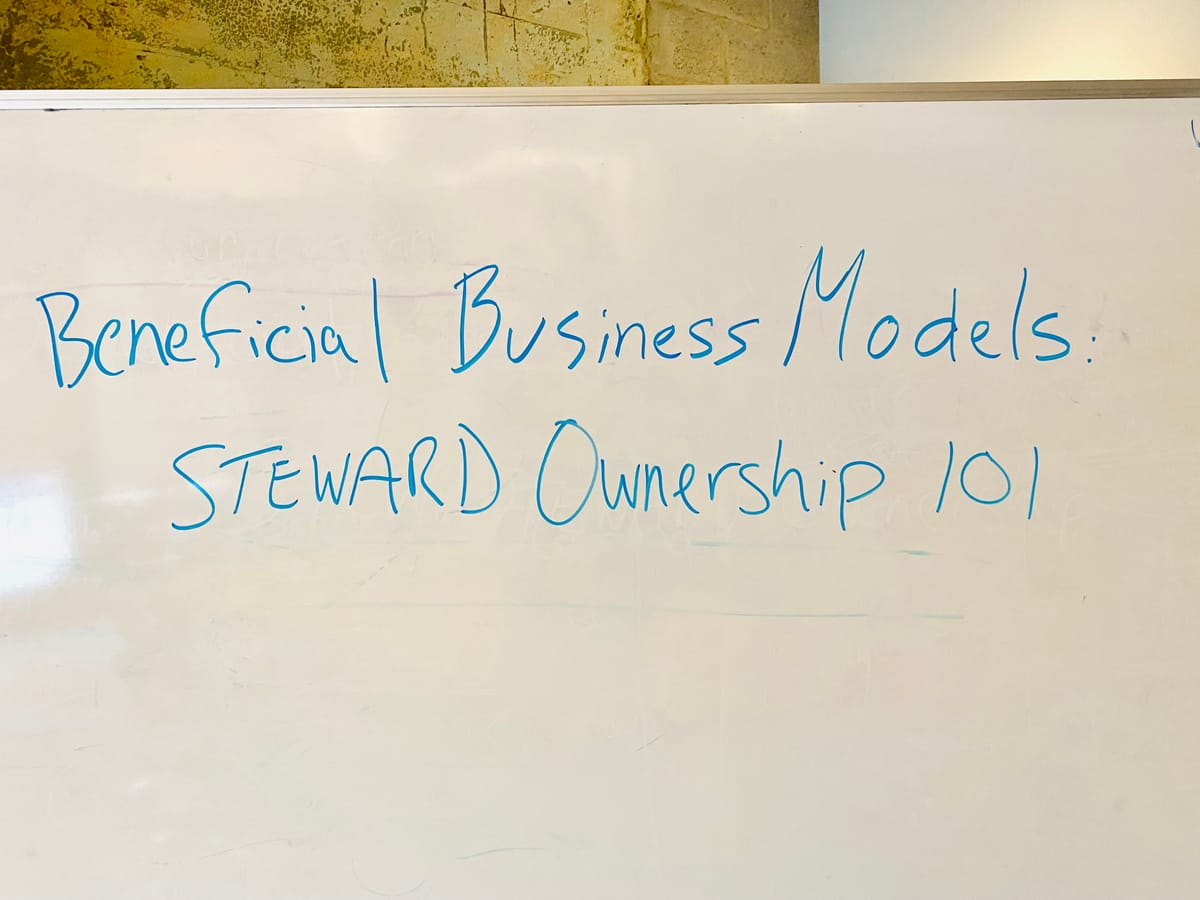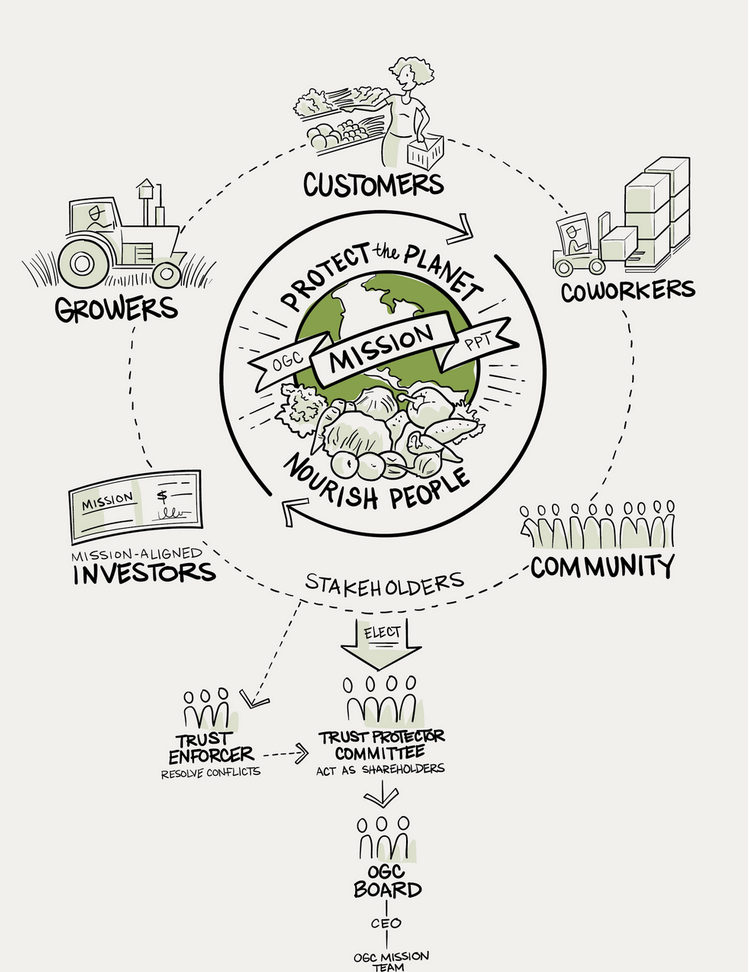Walking the Fashion Runway with a New Business Model

Steward ownership is having a fashionable moment on the business model runway, and I think it’s a style that could transcend trend to deliver long-lasting benefits to society.
I first became aware of stewardship ownership five years ago when I was introduced to Organically Grown Company, one of the country’s largest organic produce distributors and the nation’s first perpetual purpose trust.
This nascent business model gained considerable attention in 2022 when Patagonia transitioned its ownership into a purpose trust.

Steward ownership has different flavors, but at its core this structure enshrines a legal trust as the owner of the company, rather than shareholders. The trust can never be sold and is operated by stewards, generally employees or other stakeholders of the trust. Profits are shared with employees and/or reinvested into the company. The no-sell provision is the critical component that locks and company into its stated mission.
Another variety of trust ownership is the Employee Ownership Trust (EOT), which is different from Employee Stock Ownership Plans (ESOP). EOTs typically prioritize employee well-being, though they can have other beneficial purposes as well. One feature of ownership trusts compared to ESOPs is that trusts don’t have the high, ongoing administrative costs associated with the latter.
Steward ownership is gaining traction in succession planning by owners who are looking to exit the businesses they have built, would like to receive compensation for their equity, and want to ensure that the company’s mission, or purpose, is locked into place for the future. It isn’t used solely as an exit strategy, with earlier-stage enterpreneurs also embracing stewardship as an alternative ownership model for the type of company they want to create.
While the number of purpose trusts is small, the range of companies adopting stakeholder ownership covers a broad representation of industries, from internet search engines (Ecosia) to investing (Natural Investments), from book publishers (Berrett-Koehler) to retail food (Grand Central Bakery and Zingerman’s). You can see a list of current stakeholder trusts in this database maintained by Harvard Database, as well as a roster of Purpose Trust Service Providers in the U.S.
I believe empowering a stated purpose with ownership of a business through a legal trust could help reign in greed and excess and deliver sustainable benefits to communities, employees, and the environment. I hope this business model has staying power that endures beyond its current moment of corporate fashion. It’s the type of business that people could really learn to “trust.”
What do you think?
Godspeed, friends.
Russ
💬 Quote of the Week
“I am not merely touching that flower. I am touching infinity. That little flower existed long before there were human beings on this earth. It will continue to exist for thousands, yes, millions of years to come." George Washington Carver
💥 Quick Hits
• Black History Month starts here - Wishing we'd discovered this earlier, but better late than never. 28 Days of Black History will send you an email each day with the story of an untold or underappreciated Black figure in U.S. history every day of February. (There's a handy archive so you can see what you've missed already.)
• More than peanuts - Piggybacking on today's quote with an excellent article from Grist on the environmental justice legacy of George Washington Carver.
• Keeping it on the farm - We learned about Soul Fire Farm a few years back through our 1% for the Planet pledge. Soul Fire Farm is an Afro-Indigenous centered community farm committed to uprooting racism and seeding sovereignty in the food system.
🤔 Trivia Time
William Post, co-creator of Kellogg's Pop-Tarts, recently passed at the age of 96. He helped launch these breakfast snacks in 1964 with four flavors. Which of the following was NOT one of the initial flavors?
• Strawberry
• Blueberry
• Banana Bread
• Brown Sugar Cinnamon
• Apple-Currant
Today's trivia answer can be found at the bottom of this newsletter.
Find the Most Meaningful Work of Your Career
Our partner One Work has you covered with meaningful work that goes beyond a paycheck, a cubicle, or a weekly team Zoom call. You'll find purposeful jobs like those below, along with many more at the One Work job board.
• GoodLeap - Help speed the clean-energy transition at a company with a financing and software platform that makes sustainable home upgrades simple. Director of Policy, REMOTE.
• Planet - Looking to orbit a new planet with your career? This role is responsible for building, promoting, and managing the brand for Planet, a company that designs, builds, and operates the largest constellation of imaging satellites in history. Vice President of Communications, San Francisco, CA.
• Arabella Advisors - Here's your chance to help the changemakers who are creating a better world. Arabella partners with people and groups working to achieve philanthropic goals through grantmaking, advocacy, impact investing, and more. Associate Director, Nonprofit Communications, Washington, DC, Durham, NC, Chicago, IL, or REMOTE.
Trivia Answer
While we can't attest to any positive social or environmental impact of Pop-Tarts, we can affirmatively say that Banana Bread was NOT one of the first four flavors. (We're old enough to remember this product introduction, and we were always partial the Blueberry. Served alongside a glass of Tang, breakfast of astronauts!)
Please consider supporting Godspeed and this community by upgrading your free membership to a small monthly contribution or annual subscription. 🙏
